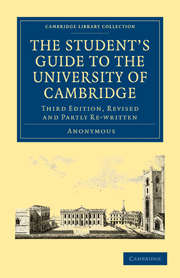Book contents
- Frontmatter
- PREFACE TO FIRST EDITION
- PREFACE
- Contents
- INTRODUCTION
- University and College Expenses
- The Mathematical Tripos
- The Classical Tripos
- The Moral Sciences Tripos
- The Natural Sciences Tripos
- On the Study of Law
- Degrees in Medicine and Surgery
- On Preparation for the Theological Examinations
- The Ordinary or Poll Degree
- University of Cambridge Local Examinations
- The Oriental Triposes
- The Historical Tripos
- Non-Collegiate Students
- Detailed Account of the several Colleges
The Oriental Triposes
Published online by Cambridge University Press: 29 August 2010
- Frontmatter
- PREFACE TO FIRST EDITION
- PREFACE
- Contents
- INTRODUCTION
- University and College Expenses
- The Mathematical Tripos
- The Classical Tripos
- The Moral Sciences Tripos
- The Natural Sciences Tripos
- On the Study of Law
- Degrees in Medicine and Surgery
- On Preparation for the Theological Examinations
- The Ordinary or Poll Degree
- University of Cambridge Local Examinations
- The Oriental Triposes
- The Historical Tripos
- Non-Collegiate Students
- Detailed Account of the several Colleges
Summary
These two Examinations in the Semitic and Indian languages were instituted in consequence of a Report issued by the Board of Oriental Studies, Nov. 13, 1871, expressing an opinion that “the time had now arrived for assigning to the Oriental languages a more prominent position amongst the studies at the University,” and recommending the establishment of a Tripos or Triposes.
As the study of the Oriental languages is now placed on the same footing as the other recognized branches of learning, degrees being conferred, and a tendency exhibited by several Colleges to bestow fellowships and scholarships for proficiency therein, there is little doubt but that they will before long attract a fair share of the attention of the students of the University. There are indeed many classes of students to whom a knowledge of these languages would be invaluable, but who have been hitherto prevented from turning their attention to them from the very fact of their not entering into the University curriculum. How useful, for example, is a knowledge of Hebrew, Chaldee or Syriac to the ycung theologian; and how invaluable is a know ledge of Arabic, Persian or Hindustani to the military or diplomatic cadet, whose profession is almost certain to take him sooner or later to the East; to say nothing of the large number of people whom business or pleasure continually calls to India or the Levant.
- Type
- Chapter
- Information
- The Student's Guide to the University of Cambridge , pp. 402 - 420Publisher: Cambridge University PressPrint publication year: 2009First published in: 1874

